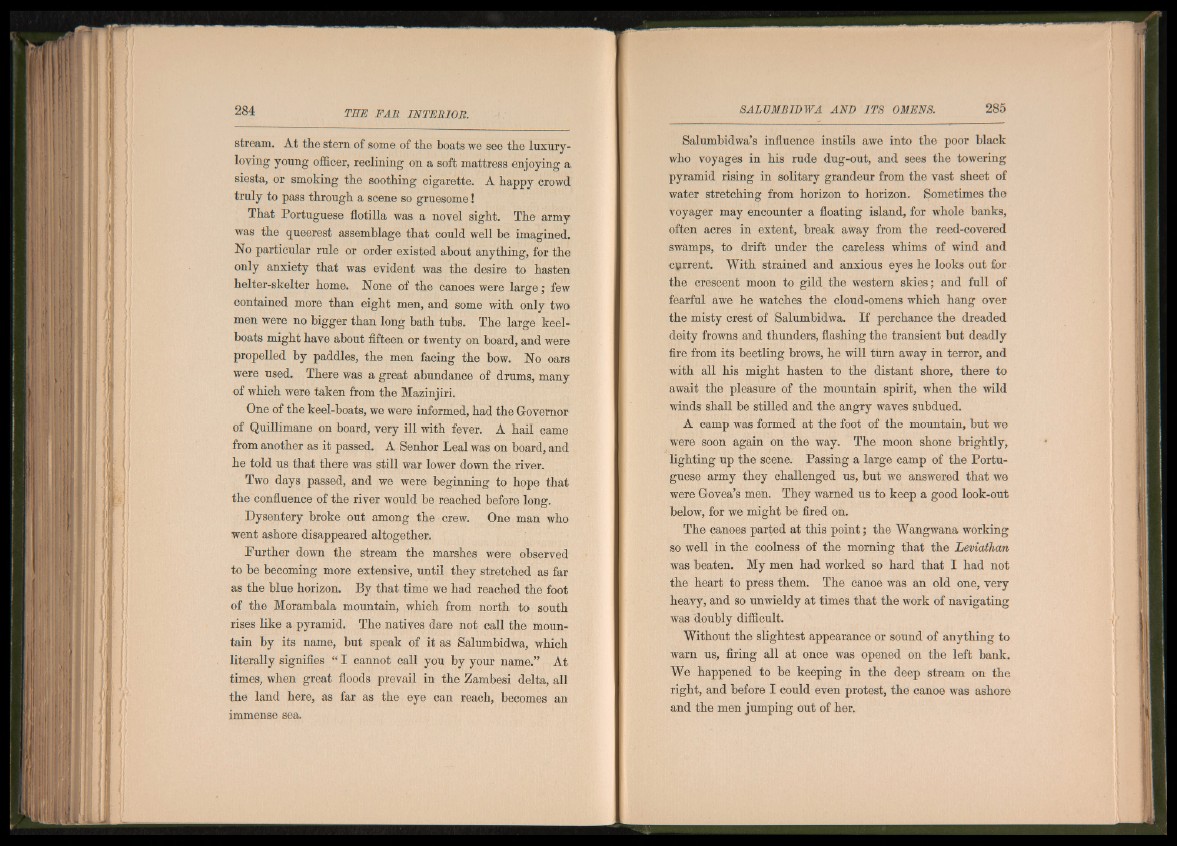
stream. At the stern of some of the boats we see the luxury-
loving young officer, reclining on a soft mattress enjoying a
siesta, or smoking the soothing cigarette. A happy crowd
truly to pass through a scene so gruesome!
That Portuguese flotilla was a novel sight. The army
was the queerest assemblage that could well be imagined.
No particular rule or order existed about anything, for the
only anxiety that was evident was the desire to hasten
helter-skelter home. None of the canoes were large j few
contained more than eight men, and some with only two
men were no bigger than long bath tubs. The large keel-
boats might have about fifteen or twenty on board, and were
propelled by paddles, the men facing the bow. No oars
were used. There was a great abundance of drums, many
of which were taken from the Mazinjiri.
One of the keel-boats, we were informed, had the Governor
of Quillimane on board, very ill with fever. A hail came
from another as it passed. A Senhor Leal was on board, and
he told us that there was still war lower down the river.
Two days passed, and we were beginning to hope that
the confluence of the river would be reached before long.
Dysentery broke out among the crew. One man who
went ashore disappeared altogether.
Further down the stream the marshes were observed
to be becoming more extensive, until they stretched as far
as the blue horizon. By that time we had reached the foot
of the Morambala mountain, which from north to south
rises like a pyramid. The natives dare not call the mountain
by its name, but speak of it as Salumbidwa, which
literally signifies “ I cannot call you by your name.” At
times, when great floods prevail in the Zambesi delta, all
the land here, as far as the eye can reach, becomes an
immense sea.
Salumbidwa’s influence instils awe into the poor black
who voyages in his rude dug-out, and sees the towering
pyramid rising in solitary grandeur from the vast sheet of
water stretching from horizon to horizon. Sometimes the
voyager may encounter a floating island, for whole banks,
often acres in extent, break away from the reed-covered
swamps, to drift under the careless whims of wind and
current. With strained and anxious eyes he looks out for
the crescent moon to gild the western skies; and full of
fearful awe he watches the cloud-omens which hang over
the misty crest of Salumbidwa. If perchance the dreaded
deity frowns and thunders, flashing the transient but deadly
fire from its beetling brows, he will turn away in terror, and
with all his might hasten to the distant shore, there to
await the pleasure of the mountain spirit, when the wild
winds shall be stilled and the angry waves subdued.
A camp was formed at the foot of the mountain, but we
were soon again on the way. The moon shone brightly,
lighting up the scene. Passing a large camp of the Portuguese
army they challenged us, but we answered that we
were Govea’s men. They warned us to keep a good look-out
below, for we might be fired on.
The canoes parted at this point; the Wangwana working
so well in the coolness of the morning that the Leviathan
was beaten. My men had worked so hard that I had not
the heart to press them. The canoe was an old one, very
heavy, and so unwieldy at times that the work of navigating
was doubly difficult.
Without the slightest appearance or sound of anything to
warn us, firing all at once was opened on the left bank.
We happened to be keeping in the deep stream on the
right, and before I could even protest, the canoe was ashore
and the men jumping out of her.